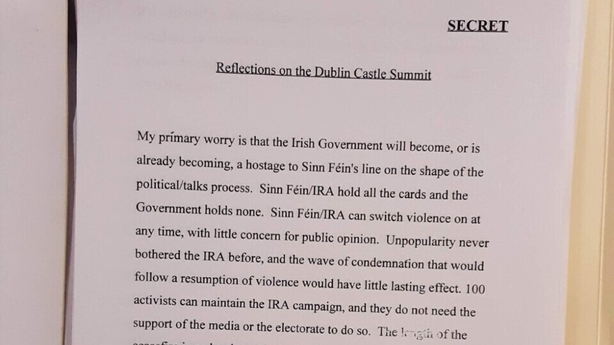By David McCullagh, Conor McMorrow and Justin McCarthy
Less than a year after the IRA ceasefire in 1994, taoiseach John Bruton was concerned that Sinn Féin "hold all the cards" and that his government was becoming a hostage to Sinn Féin's line on the political process.
In a confidential paper labelled 'Secret’, and titled "Reflections on the Dublin Castle Summit", written in July 1995, Mr Bruton charts his frustrations over the latest impasse in the slow-moving peace process. Unusually, the taoiseach wrote the 14-page memorandum himself, giving a clear insight into his thinking.
He wrote: "My primary worry is that the Irish Government will become, or is already becoming, a hostage to Sinn Féin’s line on the shape of the political/talks process. Sinn Féin hold all the cards and the Government holds none.
"Sinn Féin/IRA can switch violence on at any time, with little concern for public opinion. Unpopularity never bothered the IRA before, and the wave of condemnation that would follow a resumption of violence would have little lasting effect.
"This Government is becoming a hostage to the peace process"
"100 activists can maintain the IRA campaign and they do not need the support of the media or the electorate to do so. The length of the ceasefire is no barrier to the resumption of violence."
He contemplated a scenario where "Sinn Féin/IRA" could reach an agreement with the British Government, involving "some form of gesture of arms." He said that while this possibility existed, "the Irish Government must avoid finding itself in a position of saying that a gesture was impossible, only to find that Sinn Féin/IRA themselves accepted it at the end of the day."
He added: "On the other hand, this Government is becoming a hostage to the peace process. It has been put to me that ‘if the peace process fails, that is probably the end of the Government’".

Caught in a bind
While he didn't share that view, he thought there was some substance to it, "because unlike the IRA, we do need public opinion behind us, hence the inequality of our negotiating position vis a vis Sinn Féin."
He felt he was caught in a bind, where any statement he made that Sinn Féin could interpret as a departure from the agreed line between them, the SDLP and the Government, could be used by Sinn Féin to say that the Irish Government was being "unhelpful to the peace process".
"If the IRA resumed violence shortly afterwards, the unhelpful comment would then be harked to by Sinn Fein, Fianna Fáil and their friends in the media as the beginning of the end of the peace process."
Read more:
State Papers 1994-97: Ceasefire breakdown tests Bruton-Major relations
'Foolishly impaled': RUC's view on decommissioning demands
Eight things we learned from the State Papers; Day two
He cautioned that the fact that Fianna Fáil, and not his Fine Gael government, had started the peace process would then be used to bolster this line of argument. "They were never really committed to it all along", "they did not really understand the agony of Northern Nationalists" would be phrases that would trip easily off the tongue of commentators, he warned.
He added: "The fact that Gerry Adams would also have a lot to lose from the failure of process would not help the Government. Mr Adams is a political hostage to the IRA anyway. A sovereign Government should never be in such a position. John Hume has taken a big gamble on the Hume/Adams process. He is coming towards the end of his career. He will be seen as justified in taking the risk for peace even if it fails.
"John Major would not lose much, that is not already virtually lost. In any event, he has not compromised his freedom of action in relation to Sinn Fein/IRA in the way that this Government might, at some future point, risk doing if it has not fully thought through in advance how it would react to a breakdown in the peace process."
Based on documents now available to view in the National Archives of Ireland.

